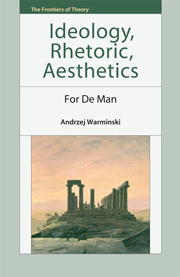Book contents
- Frontmatter
- Contents
- Series Editor's Preface
- Author's Preface
- Acknowledgements
- List of Abbreviations
- PART I Aesthetic Ideology
- PART II Hegel/Marx
- 5 Hegel/Marx: Consciousness and Life
- 6 Man and Self-Consciousness: Kojève, Romantic Ironist
- 7 Next Steps: Lukács, Jameson, Post-Dialectics
- PART III Heidegger/Derrida
- Appendix 1 A Question of an Other Order: Deflections of the Straight Man
- Appendix 2 Response to Frances Ferguson
- Index
5 - Hegel/Marx: Consciousness and Life
from PART II - Hegel/Marx
Published online by Cambridge University Press: 05 October 2013
- Frontmatter
- Contents
- Series Editor's Preface
- Author's Preface
- Acknowledgements
- List of Abbreviations
- PART I Aesthetic Ideology
- PART II Hegel/Marx
- 5 Hegel/Marx: Consciousness and Life
- 6 Man and Self-Consciousness: Kojève, Romantic Ironist
- 7 Next Steps: Lukács, Jameson, Post-Dialectics
- PART III Heidegger/Derrida
- Appendix 1 A Question of an Other Order: Deflections of the Straight Man
- Appendix 2 Response to Frances Ferguson
- Index
Summary
“For the philosophers relationship = idea. They only know the relation of ‘Man’ to himself and hence for them, all real relations become ideas.”
“Verhältnis für die Philosophen = Idee. Sie kennen bloβ das Verhältnis ‘des Menschen’ zu sich selbst, und darum werden alle wirklichen Verhältnisse ihnen zu Ideen.”
To begin reading the Hegel/Marx relationship, we may as well start with their differing versions of the relation between consciousness and life: “It's not consciousness that determines life,” writes Marx in a well-known sentence of The German Ideology, “but rather life determines consciousness” (Nicht das Bewuβtsein bestimmt das Leben, sondern das Leben bestimmt das Bewuβtsein). If the sentence is well known, it is no doubt because both in its content and in its form the sentence expresses what we all know about Marx's relation to Hegel and the Hegelian philosophy: that is, an apparently straightforward substitution of “life,” “real life,” for “consciousness,” for the primacy of consciousness in the understanding of the human being, by means of an apparently equally straightforward (chiasmic) inversion or reversal of the terms (“life” and “consciousness”) in a hierarchical opposition or relation. Of course, in context the immediate targets of this operation are the Young Hegelians, but it is clear enough that they can be its targets because, despite their claims and pretensions, they do not challenge the primacy of consciousness (over life) and hence do not differ from the Old Hegelians (or, presumably, the Old Hegel).
- Type
- Chapter
- Information
- Ideology, Rhetoric, AestheticsFor De Man, pp. 99 - 126Publisher: Edinburgh University PressPrint publication year: 2013



